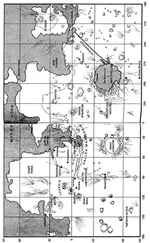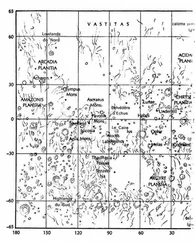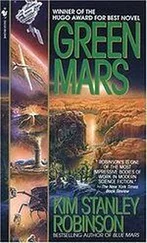When she was done eating, Nadia took her tray into the kitchen and cleaned it with a little swab, then went over to sit by Ann Clayborne and Simon Frazier and the rest of the geologists. Ann looked nearly asleep; she was spending her mornings taking long rover trips and hikes, and then working hard on the base all afternoon, trying to make up for her trips away. To Nadia she seemed strangely tense, less happy about being on Mars than one would have thought. She appeared unwilling to work on the factories, or for Hiroko; indeed she usually came to work for Nadia, who, since she was only trying to build housing, could be said to be impacting the planet less than the more ambitious teams. Maybe that was it, maybe not; Ann wasn’t saying. She was hard to know, moody— not in Maya’s extravagant Russian manner, but more subtly, and, Nadia thought, in a darker register. In Bessie Smith land.
All around them people cleaned up after dinner and talked, and looked over manifests and talked, and washed clothes and talked, until most were stretched out on their beds, talking in lower voices, until they passed out. “It’s like the first second of the universe,” Sax Russell observed, rubbing his face wearily. “All crammed together and no differentiation. Just a bunch of hot particles rushing about.”
And that was just one day; and that was what it was like every day, for day after day after day. No change in the weather to speak of, except occasionally a wisp of cloud, or an extra-windy afternoon. In the main, the days rolled by one like the next. Everything took longer than planned. Just getting into the walkers and out of the habitats was a chore, and then all the equipment had to be warmed; and even though it had been built to a uniform set of standards, the international nature of the equipment meant that there were inevitable mismatches of size and function; and the dust (“Don’t call it dust!” Ann would complain. “That’s like calling dust gravel! Call it fines, they’re fines!”) got into everything; and all the physical work in the penetrating cold was exhausting, so that they went slower than they thought they would, and began to collect a number of minor injuries. And, finally, there was just an amazing number of things to do, some of which had never even occurred to them. It took them about a month, for instance (they had budgeted ten days) just to open all the freight loads, check their contents, and move them into the appropriate stockpiles— to get to the point where they could really begin to work.
After that, they could begin to build in earnest. And here Nadia came into her own. She had had nothing to do on the Ares , it had been a kind of hibernation for her. But building things was her great talent, the nature of her genius, trained in the bitter school of Siberia. Very quickly she became the colony’s chief troubleshooter, the universal solvent as John called her. Almost every job they had benefited from her help, and as she ran around every day answering questions and giving advice, she blossomed into a kind of timeless work heaven. So much to do! So much to do! Every night in the planning sessions Hiroko worked her wiles, and the farm went up: three parallel rows of greenhouses, looking like commercial greenhouses back on Earth except smaller and very thick-walled, to keep them from exploding like party balloons. Even with interior pressures of only 300 millibars, which was barely farmable, the differential with the outside was drastic; a bad seal or a weak spot and they would go bang. But Nadia was good at cold-weather seals, and so Hiroko was calling her in a panic every other day.
Then the materials scientists needed help getting their factories operational, and the crew assembling the nuclear reactor wanted her supervision for every breath that they took, they were petrified with fright that they would do something wrong, and were not reassured by Arkady sending radio messages down from Phobos insisting they did not need such a dangerous technology, that they could get all the power they needed from wind generation. He and Phyllis had bitter arguments about this. It was Hiroko who cut Arkady off, with what she said was a Japanese commonplace: “Shikata ga nai,” meaning there is no other choice . Windmills might have generated enough power, as Arkady contended, but they didn’t have windmills, while they had been supplied with a Rickover nuclear reactor, built by the U.S. Navy and a beautiful piece of work; and no one wanted to try bootstrapping themselves into a wind-powered system, they were in too much of a hurry. Shikata ga nai . This too became one of their oft-repeated phrases.
And so every morning the construction crew for Chernobyl (Arkady’s name, of course) begged Nadia to come out with them and supervise. They had been exiled far to the east of the settlement, so that it made sense to go out for a full day with them. But then the medical team wanted her help building a clinic and some labs inside, from some discarded freight crates that they were converting into shelters. So instead of staying out at Chernobyl she would go back midday to eat, and then help the med team. Every night she passed out exhausted.
Some evenings before she did, she had long talks with Arkady, up on Phobos. His crew was having trouble with the moon’s microgravity, and he wanted her advice as well. “If only we could get into some g just to live, to sleep!” Arkady said.
“Build train tracks in a ring around the surface,” Nadia suggested out of a doze. “Make one of the tanks from the Ares into a train, and run it around the track. Get on board and run the train around fast enough to give you some g against the ceiling of the train.”
Static, then Arkady’s wild cackle. “Nadezhda Francine, I love you, I love you!”
“You love gravity.”
With all this advisory work, the construction of their permanent habitat went slowly indeed. It was only once a week or so that Nadia could climb into the open cab of a Mercedes and rumble over the torn ground to the end of the trench she had started. At this point it was ten meters wide, fifty long, and four deep, which was as deep as she wanted to go. The bottom of the trench was the same as the surface: clay, fines, rocks of all sizes. Regolith. While she worked with the bulldozer the geologists hopped in and out of the hole, taking samples and looking around, even Ann who did not like the way they were ripping up the area; but no geologist ever born could keep away from a land cut. Nadia listened to their conversation band as she worked. They figured the regolith was probably much the same all the way down to bedrock, which was too bad; regolith was not Nadia’s idea of good ground. At least its water content was low, less than a tenth of a percent, which meant they wouldn’t get much slumping under a foundation, one of the constant nightmares of Siberian construction.
When she got the regolith cut right, she was going to lay a foundation of Portland cement, the best concrete they could make with the materials at hand. It would crack unless they poured it two meters thick, but shikata ga nai . The thickness would provide some insulation. But she would have to box the mud and heat it to get it to cure; it wouldn’t below 13 degrees Centigrade, so that meant heating elements…. Slow, slow, everything was slow.
She drove the dozer forward to lengthen the trench, and it bit the ground and bucked. Then the weight of the thing told, and the scoop cut through the regolith and plowed forward. “What a pig,” Nadia said to the vehicle fondly.
“Nadia’s in love with a bulldozer,” Maya said over their band.
At least I know who I’m in love with, Nadia mouthed. She had spent too many of the evenings of the last week out in the toolshed with Maya, listening to her rattle away about her problems with John, about how she really got along in most ways better with Frank, about how she couldn’t decide what she felt, and was sure Frank hated her now, etc. etc. etc. Cleaning tools Nadia had said Da, da, da , trying to hide her lack of interest. The truth was she was tired of Maya’s problems, and would rather have discussed building materials, or almost anything else.
Читать дальше
Конец ознакомительного отрывка
Купить книгу












